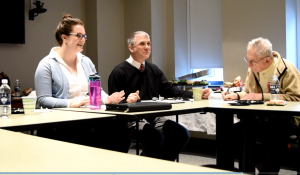 In our first faculty colloquium of the Spring 2016 semester, Abigail Miller, a third year doctoral student at the Strassler Center for Holocaust and Genocide Studies at Clark University in Worcester, Massachusetts, presented “Refugee-Survivors: Jewish Resettlement in Argentina and Holocaust Memory.” Miller, who holds the Strassler Center’s Tapper Fellowship, is currently examining the resettlement experiences of Jewish refugees in Argentina during and after the Holocaust with particular attention to the ways in which Holocaust memory and trauma affected both their resettlement and their new lives in Argentina.
In our first faculty colloquium of the Spring 2016 semester, Abigail Miller, a third year doctoral student at the Strassler Center for Holocaust and Genocide Studies at Clark University in Worcester, Massachusetts, presented “Refugee-Survivors: Jewish Resettlement in Argentina and Holocaust Memory.” Miller, who holds the Strassler Center’s Tapper Fellowship, is currently examining the resettlement experiences of Jewish refugees in Argentina during and after the Holocaust with particular attention to the ways in which Holocaust memory and trauma affected both their resettlement and their new lives in Argentina.
Argentina hosts the largest Jewish population in South America, and, with the exception of Palestine, received more Jewish refugees after World War II than any other country. Narratives of loss dominate the oral histories of Jewish refugees from the 1930s and 40s in Argentina’s Jewish community. Many losses were endured, including the loss of family and friends to the Nazi regime, the loss of physical spaces from home to school to city, and the loss of emotional security, family unity, and the connection to their previous lives in Europe.
Through study of oral history narratives (both archival and those she herself has conducted in Argentina) diaries, letters, and documents from Jewish social service agencies, Miller discovered that many refugees had a great deal of difficulty assimilating both to the extant Jewish community and to the greater Argentinian culture while other narratives revealed refugees who thrived and assimilated relatively quickly and easily. While some seemed to be able to compartmentalize their experiences and move forward, others were haunted by their experiences of victimization, indicating the way Holocaust memory shapes the refugee response to the challenges of resettlement.
Miller’s presentation included several refugee profiles whose experiences shared many commonalities but all with unique details and challenges. Noting that current refugee policies are often universalized, Miller hopes that in providing both the historical insight and particular information on the unique experiences of individual survivors, her work can be used to better design response and recovery programs for today’s refugees.
Miller is a visiting lecturer at Trinity College in Hartford where she teaches a seminar on Holocaust History and Film. She also teaches a course on Responses to the Holocaust at the University of Hartford. Prior to her doctoral studies, Miller earned a master’s degree in history from West Virginia University and a master’s degree in international relations from Collegium Civitas in Warsaw, Poland. Her presentation was both fascinating and topical, and we very much look forward to learning more about her research as it progresses!